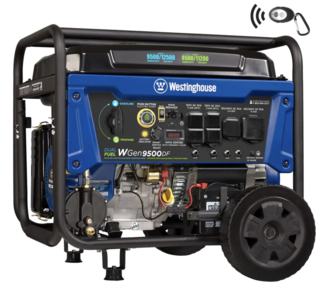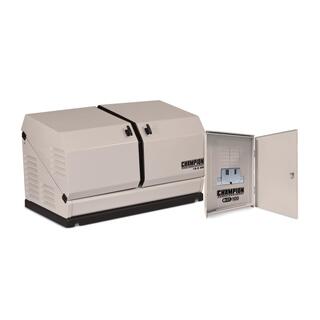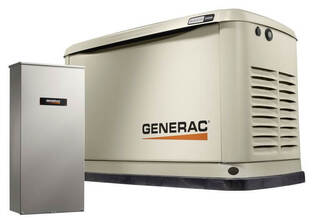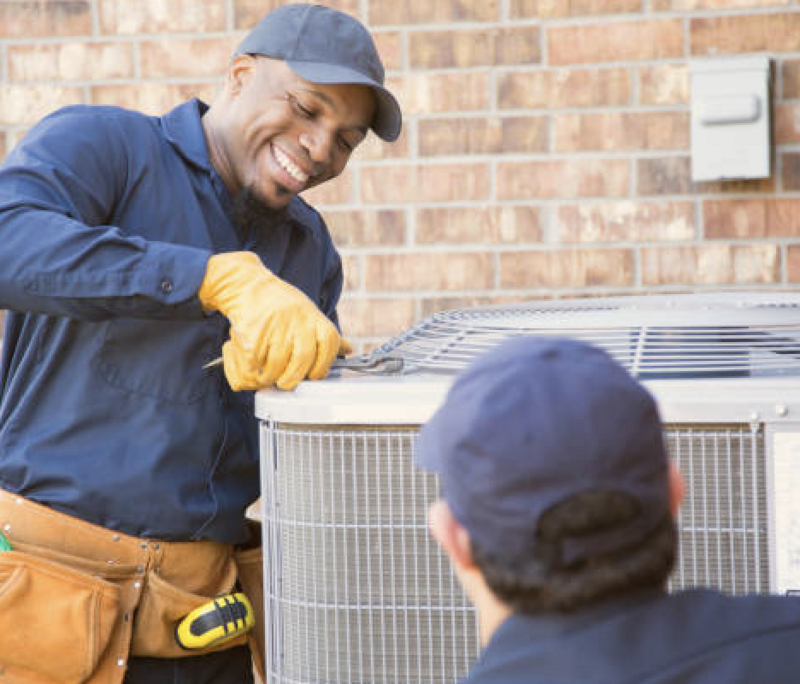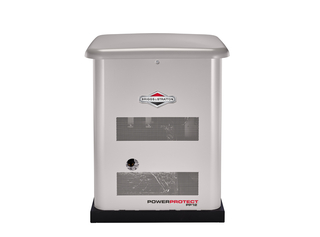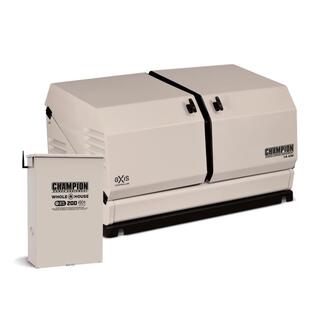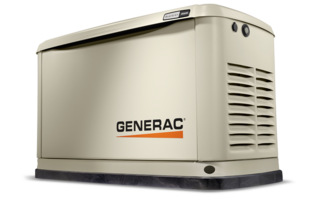Best Whole House Generators
When you lose power, a whole-house generator keeps your home’s systems up and running. Some are permanently installed to power your home in an emergency, while others are portable for off-grid camping and mobile job sites.
Finding the best generator for your home is just a matter of knowing what you’re looking for. This article will review seven of the most popular whole-house generators on the market this year. Read on for pros, cons and highlights of the best whole-house generators, plus our generator buying guide to help you find the right fit for your family’s needs.
Our Top Picks for the Best Whole-House Generators
- Westinghouse Dual Fuel Portable – Best for Versatility
- Briggs & Stratton 12,000-Watt Automatic Air Cooled Standby – Best Mobile Monitoring
- Generac Guardian 24kW Standby Generator – Best for Durability
- Champion 12.5-kW – Best Standby Generator for Your Budget
- Pulsar G12KBN Heavy Duty Portable Dual Fuel – Best for Portable Power
- Champion 14-kW aXis Home Standby Generator – Best for Quietness
- Generac Guardian 3-Phase 20kW Automatic Standby – Best Reviews
Best Whole Home Generator Reviews
| Noise Level: | 72 dBA |
| Running Wattage: | 9,500 |
| Portable: | No |
- Runs at a standard household voltage
- Easy to transport
- Has multiple use options
- Can be expensive for everyday use
- Reported power surges mean it isn't great for sensitive electronics
Why we chose it: This Westinghouse generator is a portable model that runs on gas and propane. With two household outlets, a transfer switch and two 1,120/240V outlets, you can use this generator to power multiple devices at home or on the go.
Westinghouse is one of the most trusted names in the generator business. This dual-fuel model has a 6.6-gallon fuel tank that can be filled with gas or propane and produces 9,500 running watts. Because of its portability and multiple output options, this is a versatile generator that can be used for work, camping, construction, emergency power and more.
The Westinghouse Dual Fuel generator can run for up to 12 hours on gas and 11 hours on liquid propane. It runs at 72 dBA — slightly noisier than a vacuum. That noise level is standard for a portable generator but could be a drawback if you want a home generator running quietly in the background.
The main highlight of this whole-house generator is its multiple output options. It has two standard household outlets, two RV-ready outlets and a transfer switch. That means you can use it to power multiple devices at home or supply electricity to a small or medium-sized camper. However, this generator can be prone to power surges, so it isn't recommended for sensitive electronics like LCD TVs or laptops.
Some customers report issues with Westinghouse’s shipping, such as poor packaging and late arrivals, and a few other comments reflect difficulty contacting technical support.
Overall, this generator is ideal for short-term use in emergencies, off-grid camping or powering a mobile business. Expect to budget around $1,250 for a new model.
| Noise Level: | 70 dBA |
| Running Wattage: | 12,000 |
| Portable: | No |
- Affordable option for the capacity
- Easy mobile controls
- Safe for sensitive electronics
- Louder than other small generators
- Not as durable after years of use
Why we chose it: This standby generator is not only surprisingly powerful for the price but also comes with intuitive mobile monitoring features so you can start, stop and adjust your power output from your smartphone.
Even though it’s one of the smallest generators on this list, this Briggs & Stratton model produces 12,000 running watts. This standby generator with an automatic transfer switch will kick on whenever your home loses power.
The standout feature of the Briggs & Stratton 12,000-Watt model is its mobile controls. You can monitor the power output on your smartphone, so you’ll know how much power it’s generating, when it turns on and when it shuts off. You can also use mobile monitoring to schedule tests and track the generator’s status.
One area where this generator falls short is its noise level. It runs at 70 dBA, quieter than most portable models but louder than you might want in a small home. Additionally, some customers have reported issues with starting and run time after more than five years of use. However, many others also praise its reliability and easy installation.
This Briggs & Stratton generator is a good option for someone who lives in an area with frequent power outages. It costs around $4,300, not including installation.
| Noise Level: | 67 dBA |
| Running Wattage: | 24,000 |
| Portable: | No |
- High power output
- Low noise level for the power
- Quiet self-tests
- Higher-priced option
- No transfer switch
Why we chose it: With a five-year limited warranty and regular self-tests, this is a solid whole-house backup generator for people who want long-term reliability.
The Guardian 24kW Standby Generator is one of the most powerful air-cooled generators on the market. Air-cooled generators take in cold air from the atmosphere to prevent overheating, making them more durable than other models. Because of its large 24K-watt capacity, this generator is best for someone who can’t risk losing power to crucial devices in their home.
The Guardian 24kW is built to last for years with minimal maintenance. It comes with a five-year limited warranty to extend its durability. The warranty covers all costs (parts, labor and shipping) for the first two years, then major parts for the next three.
Like the Briggs & Stratton model, this generator is Wi-Fi-enabled and can be monitored from your phone. However, it runs quieter, at just 67 dBA. Every week, the generator conducts a quiet self-test at 57 dBA. That test helps provide some peace of mind that your generator will turn on in an emergency.
Customers praise the Generac Guardian 24kW Standby Generator as reliable and generally easy to use. Some reviews report difficulty installing the unit without the help of a professional electrician. (However, given the danger involved with improperly installed generators, professional installation is a good idea.)
At a little over $6,500, this is one of the more expensive standby generators on our list, but it might be worth it if you want a reliable, high-powered backup generator with a good warranty.
| Noise Level: | 63 dBA |
| Running Wattage: | 12,500 |
| Portable: | No |
- Quieter than other options
- Self-diagnoses issues
- Durable in all weather
- No remote monitoring
- Limited customer support
Why we chose it: The Champion 12.5-kW standby generator is a simple, budget-friendly solution to power part or all of your home in a blackout.
If you don’t need all the bells and whistles that come with some of the other standby generators on this list, this little 12.5-kW generator might be a good choice. It’s an affordable model built to withstand sub-zero temperatures and heavy rains.
This generator provides 12.5 kilowatts of power on propane and 11 kilowatts on natural gas. It can be connected to your gas line, so you don’t have to refuel manually. At 63 dBA, this is one of the quietest whole home generators on our list, making it a good option for a small home in an area prone to severe weather.
The Champion 12.5-kW generator can’t be monitored remotely. You'll have to check the fuel level and test it regularly to ensure it's working. It also has some customer complaints regarding technical support. So while these generators are designed to be durable, you might have trouble contacting tech support representatives if something goes wrong.
Like other standby generators, this Champion model will turn on automatically in a power outage. It sells for around $3,300, which is affordable compared to similar home generators, but if you want a high power output to run a larger home, it might not be the right generator for you.
| Noise Level: | 74 dBA |
| Running Wattage: | 12,0000 |
| Portable: | Yes |
- Industrial-grade product
- Powerful engine
- Easy to transport and set up
- Short warranty
- Not as fuel-efficient as other options
Why we chose it: The Pulsar G12KBN has a heavy-duty engine and a large dual-fuel tank that will produce 12,000 running watts for 12 hours at a time, making it a great option for your home, RV or campsite.
This industrial-grade portable generator is designed for work sites, camping or backup power at home. Its 457 CC 4-stroke gas engine delivers a high power capacity of 12,000 watts for up to 12 hours. The eight-gallon fuel tank works with both natural gas and propane.
This generator’s noise level is pretty standard for its power capacity, rated at 74 dBA. It isn’t equipped for remote monitoring, but a clear gas gauge is on the side to measure your fuel level. The unit weighs a little over 200 pounds and has sturdy wheels for easy transportation.
Most reviews report that the generator is easy to set up and runs like advertised, but some customers have complained about the noise level. If quietness is important to you, that is a crucial factor to remember. Other customers cite frustration with the short warranty period (one year).
All in all, the Pulsar G12KBN generator is a good choice if you want a generator with high power capacity on the road. It's reasonably priced at just under $1,000 but comes with only a one-year limited warranty.
| Noise Level: | 62 dBA |
| Running Wattage: | 14,000 |
| Portable: | No |
- Only 62 dBA
- Free lifetime technical support
- Durable in freezing temperatures
- Difficult to install
- Some customer complaints about tech support
Why we chose it: The Champion 14-kW generator is a little pricier than the 12.5-kW model, but it comes with a higher power capacity and runs quieter than any other generator on our list.
This Champion model is a slightly larger, more powerful generator than the 12.5-kW generator reviewed above. But many of its features are the same: It’s a standby generator with an automatic transfer switch, built to withstand all kinds of weather. This generator can self-diagnose issues but doesn’t come with remote monitoring.
The standout feature of the Champion 14-kW is how quietly it runs. At 62 dBA, this is one of the quietest options for the price. That’s a little quieter than a standard washing machine or air conditioner. You probably won’t hear this generator running in your house.
All Champion generators come with a 10-year limited warranty and lifetime technical support. This model has received some complaints regarding tech support — they might not be easy to reach in an emergency. Aside from that, the generator gets positive reviews from online retailers.
The Champion 14-kW model may be right for you if you need to keep crucial electronics, such as medical devices, running during a power outage but don’t want the hassle of a loud, ultra-powerful whole-house generator. You should budget around $4,700 to buy this generator, not including installation.
| Noise Level: | 67 dBA |
| Running Wattage: | 20,000 |
| Portable: | No |
- Affordable price for the power capacity
- Requires professional installation
- Good warranty coverage
- Natural gas reduces power output
- Helpful customer service
Why we chose it: The Generac Guardian 3-Phase generator is a powerful standby generator with a five-year limited warranty. It gets positive reviews across multiple retailers and is easy to operate with little experience.
The Generac Guardian 20kW is a heavy-duty home backup generator with remote monitoring. Like the other Generac model on this list, it has a comprehensive five-year warranty and runs quiet self-tests to ensure peace of mind during a power outage. It runs at 67 dBA, which is fairly quiet for the power.
The most notable feature of this generator (compared to other models in the Guardian line) is its positive reviews. It consistently ranks four or five stars on different retailer websites. . Customers report helpful technical support, reliability and durability over several years of use.
One downside of this generator is the price. Starting at $5,600, it is less expensive than the 24kW generator but still in the higher price range. That said, if positive reviews are important to you, the Guardian 20kW is a good choice. It’s designed to withstand all kinds of natural disasters and will last for years.
Other generators we considered
The seven whole home generators reviewed above aren’t your only options. Here are a few other generators we considered. While they didn’t meet all of our criteria for the best whole home generators of the year, one of these models might be right for your energy needs.
Briggs & Stratton PowerSmart Series
The PowerSmart Series from Briggs & Stratton is a compact, portable generator line. If you’re looking for a small, affordable generator to take on camping trips, a PowerSmart generator could be a great choice. However, it won't power a whole house.
- Light and easy to transport
- Long-lasting power to charge mobile devices
- Not designed for a whole house
Champion Power Equipment Portable
Champion’s line of Power Equipment portable generators comes in various sizes. While some are powerful enough to power your whole home, they aren’t as efficient as Champion’s standby generators. A Champion Power Equipment generator is best for small RVs or charging devices while you’re camping. We don't recommend using this generator as a standby power source to run your home appliances.
- Multiple size options
- Designed for portability
- Inefficient larger models
Wen GN6000 Portable
The Wen GN6000 portable generator is durable and powerful but not as easy to transport as some of the other portable models on this list. It could work for you if you want a dual-fuel portable generator at a more affordable price.
- Affordable option
- Powerful for 11+ hours
- Heavy and difficult to transport
Generac Protector QS 22kW Standby
This generator from Generac’s Protector line is designed to power large homes and commercial buildings. While it is powerful and built to withstand stormy or freezing conditions, it might be too big for an average-sized home. Large generators are often more expensive and come with high installation costs.
- Powerful
- Automatically provides backup power
- Large and expensive for a standard home
Duromax Xp5500EH
This Duromax generator is an affordable portable model with 5,500 watts of power. That isn’t enough to power your whole house, but it can be helpful for short-term power on a job site or camping trip.
- Low-cost option
- Easy to transport
- Limited power output
Whole House Backup Generator Guide
A generator is a big investment. The right model will last for years but can also be expensive and, if not installed properly, can be very risky. This guide will walk you through the factors you need to consider before you buy a generator, including types, cost and maintenance.
What is a whole home generator?
Whole-home generators are designed to power an entire house and all its systems. They typically run on propane or natural gas and produce at least 3,000 to 30,000 watts of power.
Some whole home generators are portable, so they can be taken on the road to power an off-grid cabin, RV or work site. Portable generators are convenient but often need to be manually started with a pull cord. They also require refueling every 10 to 12 hours to keep running.
Standby generators are designed to be installed in your home and turn on automatically when the power goes out. These generators are best for people who don't want to lose power in their homes at all — they will kick on within a matter of seconds. Some can be monitored from your phone and even run self-tests to ensure emergency power is always available.
Standby generators are more expensive on average than other whole-house generators. You should also factor in the cost of whole-house generator installation, which should be done by a professional.
How does a whole house generator work?
Generators have internal combustion engines that run on fuel. These engines turn rotors that convert mechanical energy into AC and DC electrical energy. The process is similar to a hand-cranked flashlight but on a much larger scale.
Portable generators must be manually refueled and started, but standby home generators connect to your gas line and can start themselves. They require minimal maintenance when properly installed.
In addition to these traditional generators, there are also whole-house solar generators. A solar generator stores energy from sunlight in batteries and then releases that energy into an electrical panel when you turn the generator on. All of the generators reviewed on this list run on fuel, not solar energy. But a solar generator can be a good choice if you’re looking for a sustainable off-grid power source.
How to pick a generator
Before you start shopping for generators, you should know what you’re looking for. Here are a few factors to keep in mind.
Fuel type
Most whole-house generators run on propane or natural gas. Propane is a more expensive fuel type but often burns a little longer and provides more power than gas.
Many generators today are dual fuel, meaning they can take either propane or gas. Dual fuel engines are helpful for their versatility — even if you usually use propane, natural gas might be more accessible, especially during a natural disaster. Some standby generators can also be hooked up to your gas line at home, so you don’t have to worry about manually refueling.
Wattage
The wattage of a generator is the measure of its power output. If you’re looking for a generator that will power your whole home for multiple hours, we recommend at least 8,000 watts or higher.
Powering a small home or RV with 3,000 to 4,000 watts is possible, but you will have to reduce your use of appliances and electronics. If you want your home to function like it normally does (without shutting off TVs, fans or Wi-Fi), a generator with a 20,000-watt output or higher is best.
Another factor to keep in mind when you consider wattage is whole-house generator sizing. More powerful generators have bigger engines, making them heavier, harder to transport and more difficult to install. High-power generators can also be more expensive, so you’ll want to balance your energy needs with your budget before you buy.
Transfer switch
A transfer switch lets you connect a device to the electrical load safely.
Many standby generators have automatic transfer switches, meaning they will automatically transfer the power supply in your home from your utility to your generator when the power goes out. They will also automatically disconnect when the power grid is back on.
A manual transfer switch allows you to connect and disconnect your generator yourself. This can be helpful in an emergency but also requires caution. Switching to generator power while your utility power is still on can overload your home’s circuits and damage sensitive devices.
Mobile Monitoring
Mobile monitoring is a helpful feature in a standby generator. It allows you to track the generator’s fuel level and power output, so you always know how much power you have available. If you need to maintain power in your home for medical devices, a mobile monitoring generator will help prepare you.
Noise Level
Generators can be loud. While the noise level doesn’t affect the generator’s function, it can be a nuisance. The best whole-house generators operate at a lower decibel to keep your home as quiet as possible.
If quietness is important to you, look for a generator with a rating of less than 65 dBA.
Warranty
A good warranty is a crucial feature of any home appliance. If your standby generator isn’t covered by your home warranty, you should ensure it comes with decent coverage for parts and labor in case something goes wrong.
Budget
How much does a whole-house generator cost? Anywhere from $500 to $20,000, depending on your preferences. You should balance the generator cost with your budget to avoid overpaying for features you don't need.
Remember that standby generators are usually more expensive than portable generators and require installation. If you're wondering how much it costs to install a whole-house generator, check with the manufacturer before you buy.
Best of Home Generator FAQ
What size generator do I need for a whole house?
How much does it cost to install a home generator?
How do you install a home generator?
We don't recommend installing a standby generator on your own unless you are an experienced electrician.
How We Chose the Best Home Generators
The best generator manufacturers produce a wide range of products, so it can be tricky to pick the right model.
We looked into a few crucial factors to narrow our list down our top seven. These are also factors you should research when making your final decision.
- Mobile monitoring capability - While not all of the generators on this list come with mobile monitoring, we included a few that stand out for their easy-to-use mobile apps.
- Reviews - We looked for generators with many customer reviews on top retail sites, with the majority of reviews in the four- or five-star categories.
- Quietness - Noise level isn't everyone's priority, but some of the best standby generators are quiet enough to run in the background without interfering with daily tasks.
- Warranty - We sought out generators with extended warranties for parts and labor.
- Power capacity - Every generator on this list has a high enough running wattage to power multiple home appliances and electronics.
- Price - While cheaper isn't necessarily better, we did consider the price. The higher-priced models on this list come with features that boost their value compared to others on the market.
Summary of Money's Best Whole Home Generators of 2023
- Westinghouse Dual Fuel Portable – Best for Versatility
- Briggs & Stratton 12,000-Watt Automatic Air Cooled Standby – Best Mobile Monitoring
- Generac Guardian 24kW Standby Generator – Best for Durability
- Champion 12.5-kW – Best Standby Generator for Your Budget
- Pulsar G12KBN Heavy Duty Portable Dual Fuel – Best for Portable Power
- Champion 14-kW aXis Home Standby Generator – Best for Quietness
- Generac Guardian 3-Phase 20kW Automatic Standby – Best Reviews



